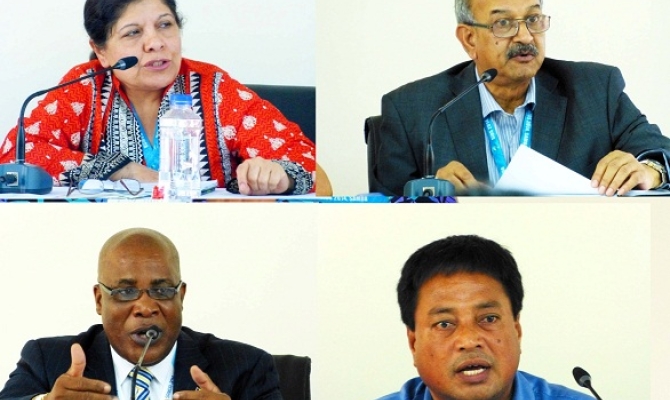
Island and Ocean Ecosystems
PACIOCEA Press Release, 26 November, Suva Fiji - PACIOCEA, a new regional marine programme, has today been launched in Fiji for a two year project in the central and west Pacific. The challenge is to deliver a diagnosis of ecological, economic, social and cultural issues to improve marine management at a large scale and identify and deal with resources for the coastal population.
Secretariat of the Pacific Regional Environment Programme (SPREP) and French Marine Protected Areas Agency, the main partners, officially launched this Pacific Ocean Ecosystem Analysis funded by the European Commission (BEST-2013). 50 international and regional experts, decision-makers and NGO representatives attended the presentation of PACIOCEA programme during a one week Marine Spatial Planning workshop, organized in University of the South Pacific, Suva, Fiji.
As marine ecosystems do not match official boundaries and are very much connected and interdependent, marine management should be implemented at different scales to be more efficient and coherent. PACIOCEA will contribute to building a vision at a scale that has rarely been done concerning almost all countries and territories of the central and west Pacific.

"A regional approach for spatial planning is interesting because many issues like biodiversity and human activities are not limited to national jurisdiction. It should strengthen cooperation and integrated management," said François GAUTHIEZ, French Marine Protected Areas Agency, today at the PACIOCEA press conference.
Benefits for decision-makers and local population :
After collation of data, PACIOCEA will analyse and map the current situation and gather stakeholders visions. Then, PACIOCEA will propose different future scenarios and illustrate the benefits provided by each one.
The main goal is to achieve a balance between the ecological, social, economic and cultural objectives for Pacific communities. Many Pacific communities are dependent on marine resources for their livelihoods and their cultural identity.
The main benefits expected through this programme are: improving data sharing, providing synthesis and simple maps to assist decision making and be able to associate and involve Pacific Island Countries and Territories towards a common vision; increasing understanding of the need to develop common approaches and marine management at different scales.
"The activities under this project will support key priorities under the Oceanscape framework, working towards a balanced marine management approach for sustainable development, management and conservation" said Tim Carutthers from SPREP.
"Through this process we can improve EEZ management that will bring about economic development and positive environmental outcomes."
First Meeting
"This week the first Paciocea meeting to share assessment took place. The next workshop will focus on how to design future scenarios. By the end of the programme we will able to discuss the lessons learnt for future support " said Anne Littaye, PACIOCEA programme manager for French Marine Protected Areas Agency (AAMP).
During the meeting, different representatives of the Pacific countries confirmed the need for information and also translating the information available to make it relevant for their audience.
Secretariat of the Pacific Regional Environment Programme (SPREP) and French Marine Protected Areas Agency, the main partners, officially launched this Pacific Ocean Ecosystem Analysis funded by the European Commission (BEST-2013). 50 international and regional experts, decision-makers and NGO representatives attended the presentation of PACIOCEA programme during a one week Marine Spatial Planning workshop, organized in University of the South Pacific, Suva, Fiji.
As marine ecosystems do not match official boundaries and are very much connected and interdependent, marine management should be implemented at different scales to be more efficient and coherent. PACIOCEA will contribute to building a vision at a scale that has rarely been done concerning almost all countries and territories of the central and west Pacific.

"A regional approach for spatial planning is interesting because many issues like biodiversity and human activities are not limited to national jurisdiction. It should strengthen cooperation and integrated management," said François GAUTHIEZ, French Marine Protected Areas Agency, today at the PACIOCEA press conference.
Benefits for decision-makers and local population :
After collation of data, PACIOCEA will analyse and map the current situation and gather stakeholders visions. Then, PACIOCEA will propose different future scenarios and illustrate the benefits provided by each one.
The main goal is to achieve a balance between the ecological, social, economic and cultural objectives for Pacific communities. Many Pacific communities are dependent on marine resources for their livelihoods and their cultural identity.
The main benefits expected through this programme are: improving data sharing, providing synthesis and simple maps to assist decision making and be able to associate and involve Pacific Island Countries and Territories towards a common vision; increasing understanding of the need to develop common approaches and marine management at different scales.
"The activities under this project will support key priorities under the Oceanscape framework, working towards a balanced marine management approach for sustainable development, management and conservation" said Tim Carutthers from SPREP.
"Through this process we can improve EEZ management that will bring about economic development and positive environmental outcomes."
First Meeting
"This week the first Paciocea meeting to share assessment took place. The next workshop will focus on how to design future scenarios. By the end of the programme we will able to discuss the lessons learnt for future support " said Anne Littaye, PACIOCEA programme manager for French Marine Protected Areas Agency (AAMP).
During the meeting, different representatives of the Pacific countries confirmed the need for information and also translating the information available to make it relevant for their audience.